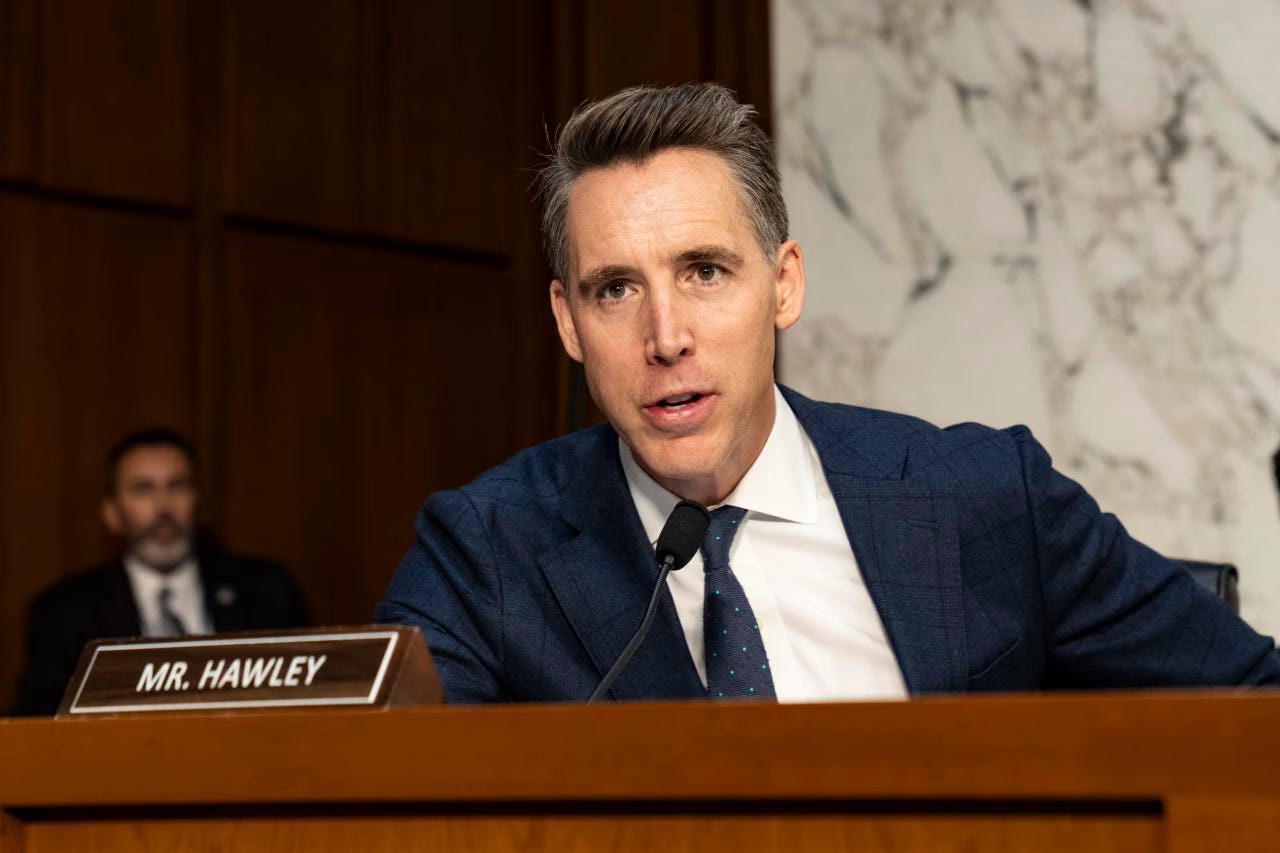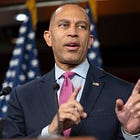Republicans are racing to save SNAP—from themselves
Plus: Hakeem Jeffries’ last-minute endorsement of New York City’s Democratic ticket and a Montana Democrat’s beef over Trump’s trade war.

👋🏾 Hi, hey, hello! It’s Monday morning—Day 27 of the government shutdown, eight days short of the longest in U.S. history. The House hasn’t voted in 38 days, a streak that will extend after House Speaker Mike Johnson (R-La.) canceled votes for the fifth consecutive week.
It’s unclear how much longer he can keep his members out of town though: The short-term funding extension the House passed the last day it was in session will expire in 25 days and will need a new deadline. House Democrats will be in town this week for in-person closed-door meetings and public events on the shutdown’s toll on everyday Americans.
Senate Majority Leader John Thune (R-S.D.) hasn’t scheduled the 13th vote to advance the House-passed bill, which has been blocked by all but three Senate Democrats a dozen times. Senators are slated to vote to confirm two judicial nominees this evening. Senate Minority Leader Chuck Schumer (D-N.Y.) announced that Senate Democrats will also force votes this week to repeal the tariffs on Canada, Brazil, and the blanket global tariffs after President Donald Trump increased Canadian tariffs by an additional 10 percent last Thursday. ICYMI: The escalation followed the airing of an anti-tariff ad during the World Series by the province of Ontario, which used excerpts of Ronald Reagan’s remarks, which the Trump administration deemed a hostile act misrepresenting facts.
President Trump is currently in Japan as part of an Asia trip that started in Malaysia and will end in South Korea to push new trade deals, shore up alliances across the Indo-Pacific and sit down with President Xi Jinping to reset the rocky U.S.–China relationship. Schumer slammed the president for leaving the country during the shutdown, characterizing it as an indication that turning the lights back on isn’t a priority for Trump.
“America is shut down and the president is skipping town,” the top Senate Democrat said in a statement before Trump departed the White House. “With the President out of the country, the responsibility falls squarely on Congressional Republicans to act—to come to the table, to do their jobs and to deliver an agreement that reopens the government and protects Americans from another health care disaster.”
In this morning’s edition, news and notes on a House Minority Leader Hakeem Jeffries (D-N.Y.) and his last-minute endorsement of New York City’s Democratic ticket—including mayoral nominee Zohran Mamdani, Montana rancher’s 2026 challenge against a Trump ally and Thune’s reaction to the No Kings Rally not being the catalyst for Democrats to reopen the government as many Republicans predicted. But let’s start with how SNAP politics emerged as the newest frontier of the shutdown showdown.
THE NATION’S MOST SUCCESSFUL anti-hunger program could become the next casualty of the government shutdown, with funding for the Supplemental Nutrition Assistance Program—or SNAP—set to run dry by week’s end. Without new federal support, many states say they may be unable to pay November benefits to the 42 million Americans who rely on the program.
The crisis is so acute that even some Republicans are sounding the alarm—from Rep. Maria Salazar of Florida to Sen. Markwayne Mullin of Oklahoma. Sen. Josh Hawley (R-Mo.) has gone further, introducing legislation to keep SNAP funding in place for the duration of the shutdown.
However, Democrats accuse their GOP counterparts of trying to rewrite history. They note that many of the same Republicans warning of a SNAP cliff voted this summer to slash the program by nearly $186 billion under the One Big Beautiful Bill Act to offset tax breaks for the wealthy and corporations. They’ve also blasted the Trump administration for politicizing the issue by refusing to use an emergency fund to cushion the shortfall, in an effort to pressure Democrats into supporting the House-passed CR that they had no input on.
Add the impending expiration of enhanced Affordable Care Act premium tax credits at the end of the year, the start of open enrollment just five days away and stubbornly high food and gas prices, and Democrats argue Republicans are ignoring the affordability crisis President Donald Trump promised to solve on Day One of his second term.
“The challenge that we confront right now is that Donald Trump and Republicans on Capitol Hill are trying to weaponize hunger in order to jam their extreme right-wing policies in their spending bill down approach to the American people,” House Minority Leader Hakeem Jeffries (D-N.Y.) told reporters on Friday. “That’s unacceptable, that’s un-American, that’s unconscionable that Republicans are actually trying to weaponize hunger across the country.”
Senate Minority Leader Chuck Schumer (D-N.Y.) said last week that the impending SNAP funding lapse doesn’t change Democrats’ shutdown strategy but should cause the Republicans to reconsider theirs.
“They should sit down and negotiate a way to address this crisis. They caused it. They’re the ones maintaining it,” Schumer added. “All they’ve got to do is sit down and do what has been done time and time and time again on any of these CR issues: Sit down and negotiate with the other side.”
HAWLEY’S BILL PROPOSES a straightforward stopgap fix. In the event the federal government fails to pass either full-year appropriations bills or a continuing resolution for the USDA in the 2026 fiscal year, the bill would authorize the Secretary of Agriculture to draw any necessary funds from the Treasury to keep benefits flowing to SNAP recipients. The measure also explicitly mandates retroactive payment of any missed benefits back to September 30 through the date of enactment to ensure that no beneficiary loses a month’s worth of aid if funding gaps persist.
But the Missouri Republican is still working with Senate GOP leadership to secure a vote on his bill. Speaker Johnson said the House would address the bill if the Senate passed it, but didn’t explicitly say whether he would allow a vote on it. House members will remain on a 48-hour notice to return to Washington if called back.
Another wrinkle that could complicate the matter: Democrats could offer a counterproposal as Sen. Chris Van Hollen (D-Md.) and Gary Peters (D-Mich.) did last week on the bill Sen. Ron Johnson (R-Wis.) introduced to guarantee federal workers who have to keep working during a government shutdown still receive on-time paychecks. (All three failed to advance last week.) House leadership expects the same fate for any SNAP bills that come to the floor this week.
This explains why Hill Democrats are calling on the Trump administration to tap a USDA emergency fund of about $5 billion to help close the $9 billion SNAP funding shortfall for November. The fund was created to help the USDA respond to unexpected disruptions in food assistance and nutrition programs. Democrats argue the imminent funding lapse is the kind of crisis millions of families now face and that drawing from the fund could prevent an abrupt halt to aid while Congress remains deadlocked.
214 House Democrats—led by House Agriculture Subcommittee on Nutrition and Foreign Agriculture Ranking Member Jahana Hayes (D-Conn.) and House Agriculture Committee Ranking Member Angie Craig (D-Minn.)—urged Agriculture Secretary Brooke Rollins in a letter last Friday to deploy the contingency funds. Sens. Cory Booker (D-N.J.), Ben Ray Luján (D-N.M.) and Amy Klobuchar (D-Minn.), the ranking member of the Senate Agriculture Committee, led all Senate Democrats in sending Rollins a similar letter the day before. Crystal FitzSimons, president of the Food Resource & Action Center, added that the government must act ASAP because hungry people can’t wait.
“USDA should utilize its contingency reserves and any additional funding sources to ensure that benefits are not disrupted,” FitzSimons said in a statement. “Time is running out. USDA must act quickly to support the power and promise of SNAP. The health and strength of our nation depends on it.”
But the White House has so far resisted, claiming that the account is intended for natural disasters and agricultural emergencies, not to cover benefit obligations during an appropriations lapse. Administration officials have also argued that using it for SNAP would amount to an unauthorized spending maneuver that violates federal budget law—a rationale Democrats dismiss as bureaucratic hair-splitting in the midst of a self-inflicted shutdown, especially when the administration has previously demonstrated few reservations about bending its interpretation of the law to fit its policy or political priorities.
“The president, his agriculture secretary, and his budget director [Russell Vought] need to stop playing politics with Americans struggling to afford food and release the SNAP funds that Democrats and Republicans in the House and Senate overwhelmingly voted to provide,” Craig and House Appropriations Committee Ranking Member Rosa DeLauro (D-Conn.) said in a statement.
A spokesperson for the Young Farmers of America noted that SNAP is also a farm policy that stabilizes markets for small producers and keeps food dollars in local communities—affecting not only the families who depend on it but also the farmers who sell directly to SNAP customers through farmers markets, community-supported agriculture models and local retailers.
As benefits stagnate and purchasing power declines, local food markets lose steady customers and crucial income in a moment when farmers are already feeling the pinch from the market instability induced by Trump’s trade wars. (FWIW, Hawley also introduced legislation to authorize the USDA to draw funds from the Treasury to keep key farm-program services, including those administered by the Farm Service Agency, running uninterrupted during a lapse in appropriations over the next fiscal year.)
SNAP IS WIDELY considered one of the nation’s most successful anti-poverty programs because it delivers immediate, targeted assistance to households that need it most while also supporting local economies. The program not only reduces food insecurity and lifts millions of families above the poverty line each year, but also acts as an automatic stabilizer during economic downturns, expanding when unemployment rises and contracting as conditions improve.
According to USDA data, every dollar spent on SNAP generates roughly $1.50 to $1.80 in economic activity, as recipients use their benefits at grocery stores and farmers’ markets in communities across the country. The combination of efficiency, flexibility and proven impact has long made it a bipartisan success story, even as political fights over its size and scope have intensified in recent years.
Republicans reject the suggestion that their recent concern over the program’s stability amounts to hypocrisy. They argue the SNAP cuts included in the One Big Beautiful Bill Act were long-term deficit-reduction measures unrelated to the short-term funding lapse caused by the shutdown. GOP lawmakers and aides say the two issues exist on separate tracks—one focused on fiscal reform, the other on maintaining basic government operations—and insist that no one in Congress wants to see low-income families lose access to food assistance because of political gridlock. Still, Democrats counter that the distinction rings hollow given the scope of the cuts and the GOP’s unwillingness to negotiate with them on a compromise to reopen the government.
“Here’s the thing: This group of people—these extremists on the other side of the aisle—we will not let them lecture the American people about nutritional assistance, when in their One Big Ugly Bill, they cut $186 billion from the Supplemental Nutritional Assistance Program,” Jeffries said. “That’s the largest SNAP cut in American history. And people ought to believe right now that Republicans actually care about hunger when they ripped food away from the mouths of hungry children, seniors, families, women and veterans to provide massive tax breaks to their billionaire donors? Get lost with that in terms of Republican spin. The American people are not buying it.”
○ ● ●
Hakeem Jeffries formally endorsed the Democratic ticket in New York City’s mayoral race on Friday, stopping short of explicitly backing Democratic Socialist nominee Zohran Mamdani. In a carefully balanced statement, Jeffries praised Mamdani’s “commitment to being a Mayor for all New Yorkers,” his focus on the affordability crisis, and his pledge to retain Police Commissioner Jessica Tisch—while stressing there will be “areas of principled disagreement.”
Across three weekend interviews, Jeffries reiterated the same calibration: alignment on affordability, public safety and opposition to Donald Trump’s extremism, but independence on other issues ranging from foreign policy to the future of the city’s housing strategy. He emphasized that working-class neighborhoods of color have been “hurt by gentrification and housing displacement” and said the only way to fix it is through public-private partnerships that “build our way out of it.”
Jeffries also underscored the political backdrop driving his timing: the federal shutdown, Trump’s inability to lower prices as quickly as he promised he would when retook office and the stakes for Democrats heading into 2026. On CNN, he tied his city-level support to a broader fight against “the national nightmare being visited on the American people by Republican extremism.” On MSNBC, he said he’d taken time to meet with Mamdani before weighing in, noting he hadn’t known him before the primary and wanted to see how he approached public safety and antisemitism.
Jeffries took his time before lending Mamdani his support—to the chagrin of Mamdani’s supporters and House and Senate progressives who had urged him to get off the sidelines sooner. Now that he’s done so, the Democratic leader will almost certainly have to contend with Republican efforts to paint Mamdani, a self-described Democratic socialist, as the face and future of the Democratic Party, a framing Jeffries will want to blunt as he works to project his caucus as mainstream, disciplined and focused on governing.
● ○ ●
Montana’s 1st District isn’t exactly fertile ground for Democrats. The western Montana seat—rated R+5 by Cook Political Report—has favored President Trump in three straight elections and sent former Interior Secretary Ryan Zinke back to Congress by a comfortable margin in 2022, after a stint in the first Trump administration following his first election to Congress in 2014. But frustration over the economic fallout of Trump’s trade policies has begun to surface in places where Republicans once won on pocketbook credibility.
That’s the opening Matt Rains, a fourth-generation rancher and West Point graduate, hopes to seize. Rains launched his campaign last week, arguing that “Montanans are getting squeezed from every direction,” pointing to rising costs and retaliatory tariffs that have left cattle producers paying more and earning less. As chief of staff for the Montana Farmers Union, Rains helped build a USDA-certified meat-processing co-op to keep more profits in-state—work that’s likely to become a calling card of his campaign.
Zinke, a close Trump ally, has defended the president’s trade posture as tough but necessary leverage to secure better deals abroad. Yet the political risk for Republicans isn’t limited to Montana: as Trump’s tariff policies ripple through rural economies, even GOP incumbents in safely red territory could find themselves fielding sharper-than-usual questions about whether global America First trade wars are still paying dividends back home.
● ● ○
Many congressional Republicans predicted Democrats would agree to reopen the government after last weekend’s No Kings Rally, believing the demonstrations would mark a turning point in the shutdown standoff. That expectation has not materialized.
Leader Thune told me he viewed the rallies as an inflection point for Democrats and seemed frustrated that more moderates have yet to break ranks from Schumer and the rest of the Democratic caucus.
“If they had done anything before that, they would have gotten blown up,” Thune said. “But I still think there are rank-and-file Democrats who don’t like this position they’re in, and they shouldn’t. It gets more painful with each day for federal workers and for the American people. So I’m hoping that they’ll come to their senses.”
Democrats still have shown no indication of backing down, continuing to insist that any deal to reopen the government must include an extension of the Affordable Care Act’s enhanced premium tax credits. Public polling showing Republicans bearing more of the blame for the shutdown has strengthened Democrats’ confidence in holding their position, complicating GOP expectations that the weekend rallies would alter the dynamic.





